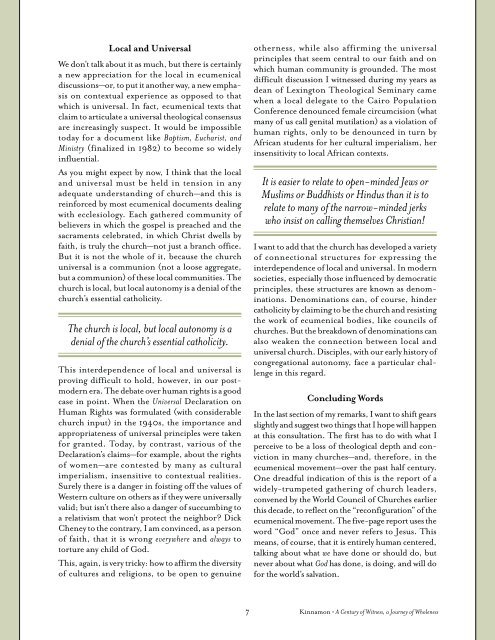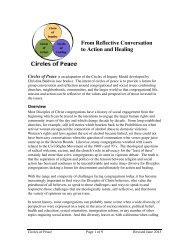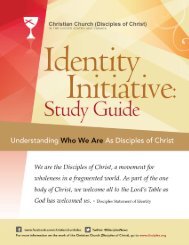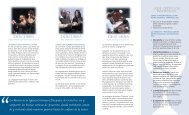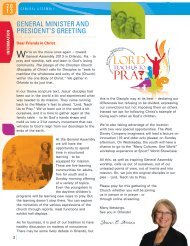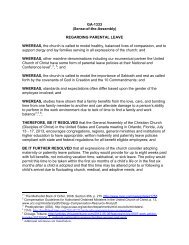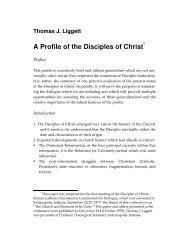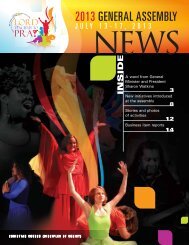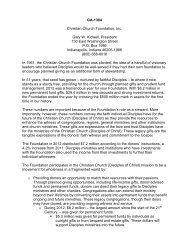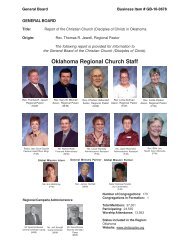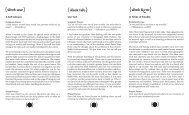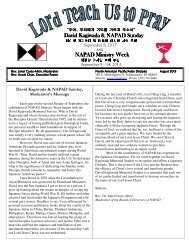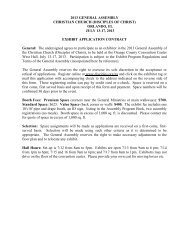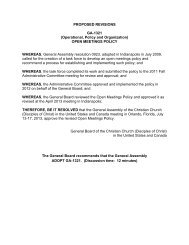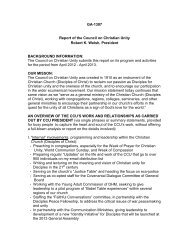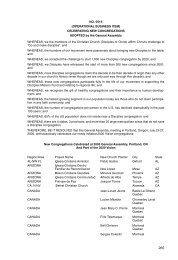RESOURCING THE CHURCH FOR ECUMENICAL MINISTRy A ...
RESOURCING THE CHURCH FOR ECUMENICAL MINISTRy A ...
RESOURCING THE CHURCH FOR ECUMENICAL MINISTRy A ...
Create successful ePaper yourself
Turn your PDF publications into a flip-book with our unique Google optimized e-Paper software.
Local and Universal<br />
We don’t talk about it as much, but there is certainly<br />
a new appreciation for the local in ecumenical<br />
discussions—or, to put it another way, a new emphasis<br />
on contextual experience as opposed to that<br />
which is universal. In fact, ecumenical texts that<br />
claim to articulate a universal theological consensus<br />
are increasingly suspect. It would be impossible<br />
today for a document like Baptism, Eucharist, and<br />
Ministry (finalized in 1982) to become so widely<br />
influential.<br />
As you might expect by now, I think that the local<br />
and universal must be held in tension in any<br />
adequate understanding of church—and this is<br />
reinforced by most ecumenical documents dealing<br />
with ecclesiology. Each gathered community of<br />
believers in which the gospel is preached and the<br />
sacraments celebrated, in which Christ dwells by<br />
faith, is truly the church—not just a branch office.<br />
But it is not the whole of it, because the church<br />
universal is a communion (not a loose aggregate,<br />
but a communion) of these local communities. The<br />
church is local, but local autonomy is a denial of the<br />
church’s essential catholicity.<br />
The church is local, but local autonomy is a<br />
denial of the church’s essential catholicity.<br />
This interdependence of local and universal is<br />
proving difficult to hold, however, in our postmodern<br />
era. The debate over human rights is a good<br />
case in point. When the Universal Declaration on<br />
Human Rights was formulated (with considerable<br />
church input) in the 1940s, the importance and<br />
appropriateness of universal principles were taken<br />
for granted. Today, by contrast, various of the<br />
Declaration’s claims—for example, about the rights<br />
of women—are contested by many as cultural<br />
imperialism, insensitive to contextual realities.<br />
Surely there is a danger in foisting off the values of<br />
Western culture on others as if they were universally<br />
valid; but isn’t there also a danger of succumbing to<br />
a relativism that won’t protect the neighbor? Dick<br />
Cheney to the contrary, I am convinced, as a person<br />
of faith, that it is wrong everywhere and always to<br />
torture any child of God.<br />
This, again, is very tricky: how to affirm the diversity<br />
of cultures and religions, to be open to genuine<br />
7<br />
otherness, while also affirming the universal<br />
principles that seem central to our faith and on<br />
which human community is grounded. The most<br />
difficult discussion I witnessed during my years as<br />
dean of Lexington Theological Seminary came<br />
when a local delegate to the Cairo Population<br />
Conference denounced female circumcision (what<br />
many of us call genital mutilation) as a violation of<br />
human rights, only to be denounced in turn by<br />
African students for her cultural imperialism, her<br />
insensitivity to local African contexts.<br />
It is easier to relate to open-minded Jews or<br />
Muslims or Buddhists or Hindus than it is to<br />
relate to many of the narrow-minded jerks<br />
who insist on calling themselves Christian!<br />
I want to add that the church has developed a variety<br />
of connectional structures for expressing the<br />
interdependence of local and universal. In modern<br />
societies, especially those influenced by democratic<br />
principles, these structures are known as denominations.<br />
Denominations can, of course, hinder<br />
catholicity by claiming to be the church and resisting<br />
the work of ecumenical bodies, like councils of<br />
churches. But the breakdown of denominations can<br />
also weaken the connection between local and<br />
universal church. Disciples, with our early history of<br />
congregational autonomy, face a particular challenge<br />
in this regard.<br />
Concluding Words<br />
In the last section of my remarks, I want to shift gears<br />
slightly and suggest two things that I hope will happen<br />
at this consultation. The first has to do with what I<br />
perceive to be a loss of theological depth and conviction<br />
in many churches—and, therefore, in the<br />
ecumenical movement—over the past half century.<br />
One dreadful indication of this is the report of a<br />
widely-trumpeted gathering of church leaders,<br />
convened by the World Council of Churches earlier<br />
this decade, to reflect on the “reconfiguration” of the<br />
ecumenical movement. The five-page report uses the<br />
word “God” once and never refers to Jesus. This<br />
means, of course, that it is entirely human centered,<br />
talking about what we have done or should do, but<br />
never about what God has done, is doing, and will do<br />
for the world’s salvation.<br />
Kinnamon • A Century of Witness, a Journey of Wholeness


